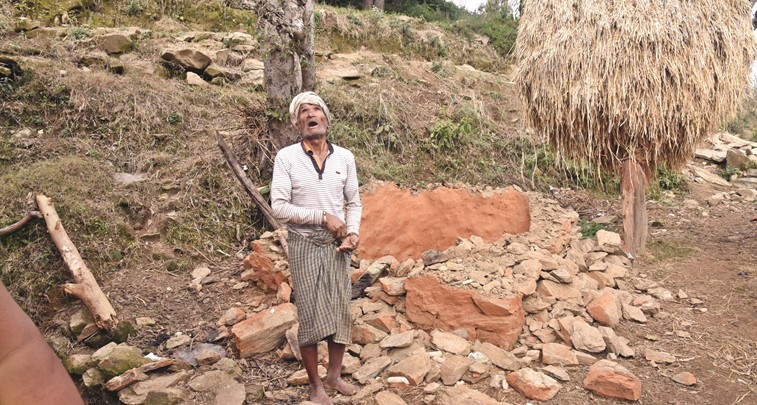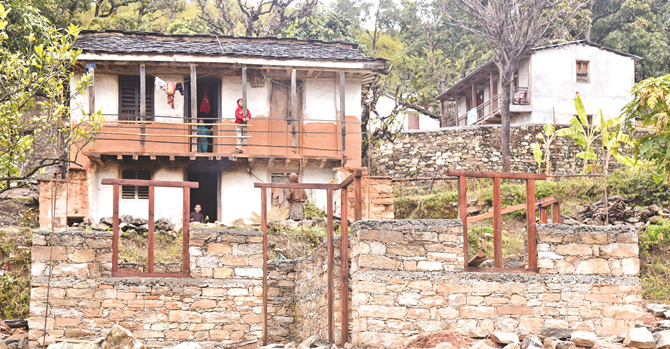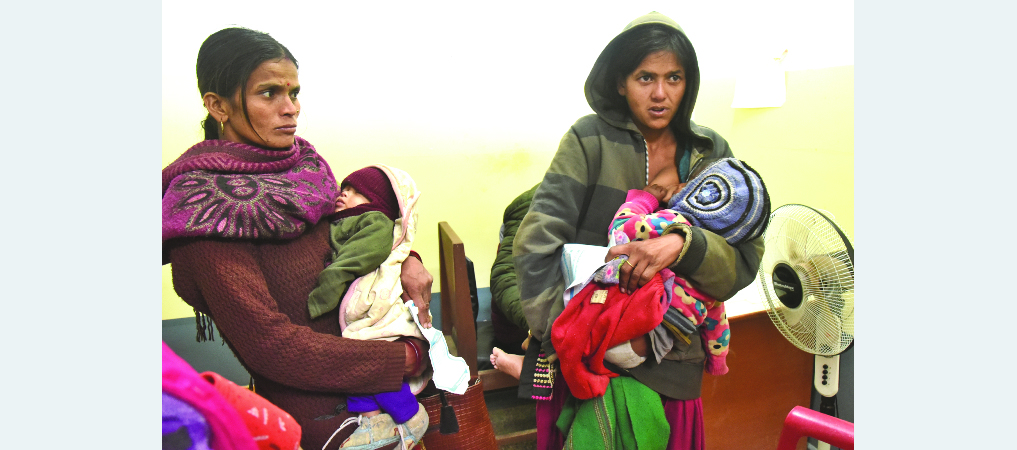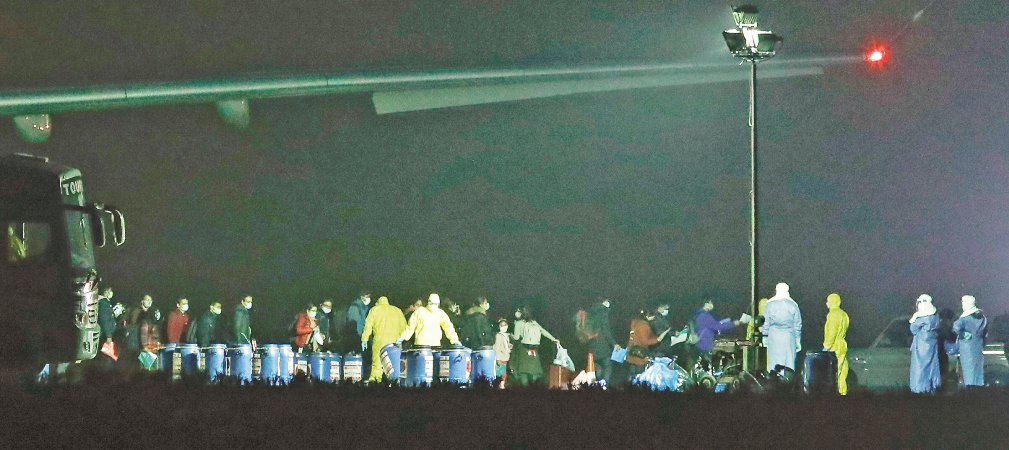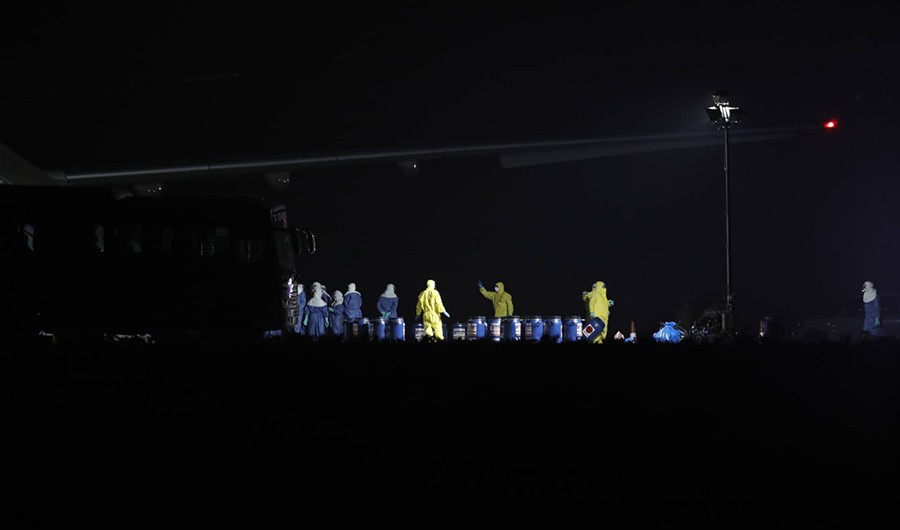Unable to replace flip-flop straps, Haliya children miss classes
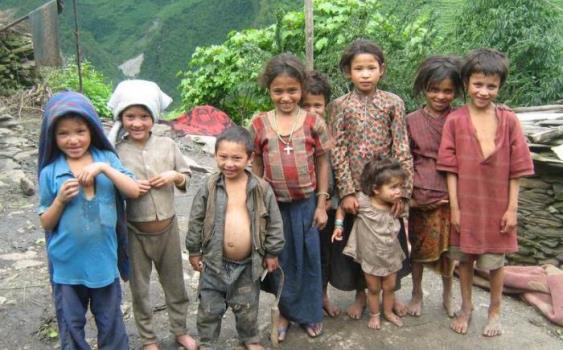
Ajita Rijal
Baitadi, Feb. 22: For seventh-grader Shankar Ram Bhul, of Sahilek in Baitadi, it had been three days since the straps of his only pair of flip-flops were broken, but he didn’t have the money to buy new straps, forcing him to remain home, unable to walk barefoot to school. Bhul shared he had missed school in the past for not having a proper school uniform.
Similar was the situation of another boy Harke Bhul, who had missed school because he didn’t have a copy and pen, so had stayed home. Harke’s mother Bimala said that Harke is one of the brightest students in the school, but she felt sorry that because she had not managed to buy him pen and copies, he had missed school for past two days.
Both Shankar Ram and Harke hail from the Haliya Village near Baitadi district headquarters in Dasharath Municipality-4, which the TRN team visited recently. The small village looked green from afar, due to the green plastic sheets that were put to cover broken tiles on their roofs. Majority of them didn’t even have a zinc tin roof.
The situation looked even wretched upon reaching the homes. Only Haliyas lived in this village, and most houses looked untidy and dirty with poor sanitation, where school-aged children were lethargically lying around.
The children were home for reasons which sound simple to many city-dwellers but mean a lot to these children - it was because the straps of their slippers had broken and they didn’t’ have money to repair or buy new straps.
For children studying in private boarding schools in more affluent neighborhoods in the district headquarters, towns and bigger cities missing a school for a day would probably be because of sickness or being away from home for family reasons.
However, for Haliya children like Shankar Ram and Harke, the story is entirely different. They miss school unless they dare to walk barefoot to school.
The Dasharathchand Primary School, located in Dasharathchand Municipality-4, is one of the oldest and historical schools in Baitadi district. However, despite its glorious history, the current condition of the school’s infrastructure and its students, all of whom are either Haliya or Dalit children, is heart-touching.
The Dasharath Primary School was established 100 years ago, by the Late Rana Prime Minister Dev Shamsher at Gadhi of Baitadi in 1976 BS Jestha 2, then as a language school. In the past, children from so-called well-off families and other communities studied at this school. However, lately only children of the Haliya (free bonded labour) and Dalit children attend the school.
On the day when the TRN team visited the school in late January, the students were having their free lunch in the afternoon. They seemed happy to be munching on fried beans, haluwa and puri, amidst their mid-day appetite. The free lunch is being provided by the Municipality.
“The lunch support was removed initially, citing that the school fell in the vicinity of district headquarters. However, it was re-introduced considering the heart-touching condition of the students” said Principal Sarap Singh Thagunna. With free lunch, the Principal hopes the students will attend school more regularly.
The students that came to school regularly would be on an empty stomach. Luckily, that was going to change for good now that they would get free school lunch. Their happy faces while feasting on the haluwa and puri and beans that day meant they no longer needed to worry about lunch even if they didn’t eat anything in the morning.
The 100-year old school’s physical infrastructure too was in a dilapidated condition. The school didn’t have a drinking water tap, and no running water in the toilets. A portion of the building on the backside was about to fall down.
The school should have become a model of education by now, but here the condition was just the opposite. When the latest windstorm blew away the
corrugated zinc tin roof of the school, it was only after Nepal Red Cross Society (NRCS) donated Rs. 50,000 that the students could take refuge under the roof.
Chairman of the School Management Committee, Rajuram Bhul, lamented that nobody paid much attention to the school as it only had Haliya and Dalit students. Around 65 students are admitted at the school, however only 30-40 attend classes regularly.
School principal Thagunna said that most of the parents of the Haliya children earned their living through daily labour work, but sadly the hard-earned money was spent in alcohol drinking and even worse they came home drunk and resorted to domestic violence.
Recent News

Do not make expressions casting dout on election: EC
14 Apr, 2022
CM Bhatta says may New Year 2079 BS inspire positive thinking
14 Apr, 2022
Three new cases, 44 recoveries in 24 hours
14 Apr, 2022
689 climbers of 84 teams so far acquire permits for climbing various peaks this spring season
14 Apr, 2022
How the rising cost of living crisis is impacting Nepal
14 Apr, 2022
US military confirms an interstellar meteor collided with Earth
14 Apr, 2022
Valneva Covid vaccine approved for use in UK
14 Apr, 2022
Chair Prachanda highlights need of unity among Maoist, Communist forces
14 Apr, 2022
Ranbir Kapoor and Alia Bhatt: Bollywood toasts star couple on wedding
14 Apr, 2022
President Bhandari confers decorations (Photo Feature)
14 Apr, 2022



